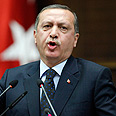
Erdogan says sanctions against Iran 'mistake'
Turkish prime minister, whose country voted against UN sanctions against Iran, says he will continue quest for diplomatic solution to Iranian nuclear issue. US secretary of defense says pivotal ally increasingly close with East
Turkey said on Thursday that the UN imposition of sanctions on Iran was a "mistake" and that together with Brazil it would continue to seek a diplomatic solution to remove concerns over Iran's nuclear program.
In a speech to an Arab and Turkish ministerial forum, Prime Minister Tayyip Erdogan also announced plans to form a regional free trade zone with three Arab states -- Jordan, Lebanon and Syria.
The moves will add to concerns, voiced on Wednesday by US Defense Secretary Robert Gates that the EU-candidate country and pivotal Western ally was in danger of lurching eastward.
Turkey and Brazil, both non-permanent members of the UN Security Council, were the only states among the council's 15 members to vote on Wednesday against the imposition of new sanctions against Iran. Lebanon abstained.
"We would not want to participate in such a mistake because history will not forgive us," Erdogan told a meeting attended by ministers from 22 members of the Arab League.
He said Turkey intended, with Brazil, to continue engaging Tehran, having last month secured a nuclear fuel swap deal that they had hoped would head off sanctions.
In the end, Western countries along with Russia and China viewed that deal as too little too late and pressed on with a fourth round of sanctions, as Iran continued uranium enrichment that world powers fear could be used for nuclear weapons.
Turkey believes that sanctions are ineffective, and there are dangers in pushing the Islamic republic into a corner.
"Isolation is not the solution to Iran's problems," Erdogan said.
East or West
Though a non-Arab, Erdogan has become a hero to many people across the Arab world for championing the cause of Gaza's Palestinians and putting their plight near the top of the world agenda after an Israeli commando raid on a Turkish aid ship.
A Cold War ally of the West, Turkey had been largely Western facing, but under Erdogan policy has shifted to deepen ties with the former Soviet bloc and Middle East.
Erdogan raised the question himself over Turkey's direction, and spoke of "secret efforts" by some European countries to slow down Turkey's bid for membership of the European Union. But he said Turkey was continuing with reforms to meet EU requirements.
He went on to say Turkey would be forming a free-trade and visa free travel zone with the three Arab countries.
Critics say Erdogan's Islamist-leaning government could risk tilting too far in trying to forge stronger ties with Middle East governments that the West doesn't trust -- a category that includes Syria as well as Iran.
Speaking earlier Foreign Minister Ahmet Davutoglu said Turkey was determined to boost economic cooperation with the Arab world to the highest level possible.
"We want a vehicle to leave from Turkey and reach Morocco without stopping at any border gates," said Davutoglu. "Within this framework, we will announce in the afternoon a declaration to form a free trade zone among Turkey, Syria, Jordan and Lebanon."
Turkey exported $1.4 billion worth of goods to Syria and $690 million to Lebanon in 2009. Turkey imports a small amount of goods from its Arab neighbors.
Turkey's growing ties with Muslim neighbors, since the Islamist-rooted AK Party came to power in 2002, has expanded markets for the export-oriented country. Exports to Iran have grown 500 percent since 2002.










